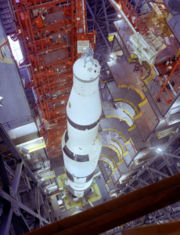Colonising Space/Open design making space truly accessible
Making the colonisation of space a truly global collaborative process is an amazing opportunity to bring people and cultures together. Not a project of any one nation but a project of humanity with contributions from everywhere. The culture of openness is also the perfect way to start the spread of life away from Earth - it is the right attitude and the best way for people to get the most out of each other. When people want to convey what we can accomplish as a species, the standard symbol is the Apollo moon landings; there is no field like space exploration for people to come together, co-operate and accomplish amazing things.
Space exploration under the auspices of governments has proven too inefficient and expensive. Under government control, the cost of launch has been $5-15k per kilogram. This cost does not come from materials, or fuel, or anything else inherent in the technology; it comes from the inefficiency and expense of a development pipeline that requires every part to be built and inspected by hand.
Spaceflight done by a commercial organisation is 4-10 times cheaper than an equivalent government-funded mission[1]. But open hardware is often 4-20 times cheaper than commercial equivalents. If open collaboration could achieve the same radical reduction in the cost of rockets that it has in 3D printing, electroencephalography, DNA sequencing and other areas, space would become accessible to all and it would mark the beginning of humanity's era as a spacefaring race.
Commercial reasons alone are not the right basis for colonising space and the lesser efficiency of that model over an open culture would likely only ever make it a niche activity with potential for conflict. It is due to the lack of commercial viability that no-one has left low-earth orbit since the Apollo program. But open culture does not need to revolve around conventional economics.
There have been fewer than 500 manned spaceflights in human history, largely because of the prohibitive cost. Radically cheaper spaceflight will allow us to fly thousands of spaceflights a year. This is the only way to accrue the knowledge needed to make launches reliable.
Ultimately the possibility of space colonisation is a matter of energy, material, information and intelligence — and all four are in reality massively abundant.
